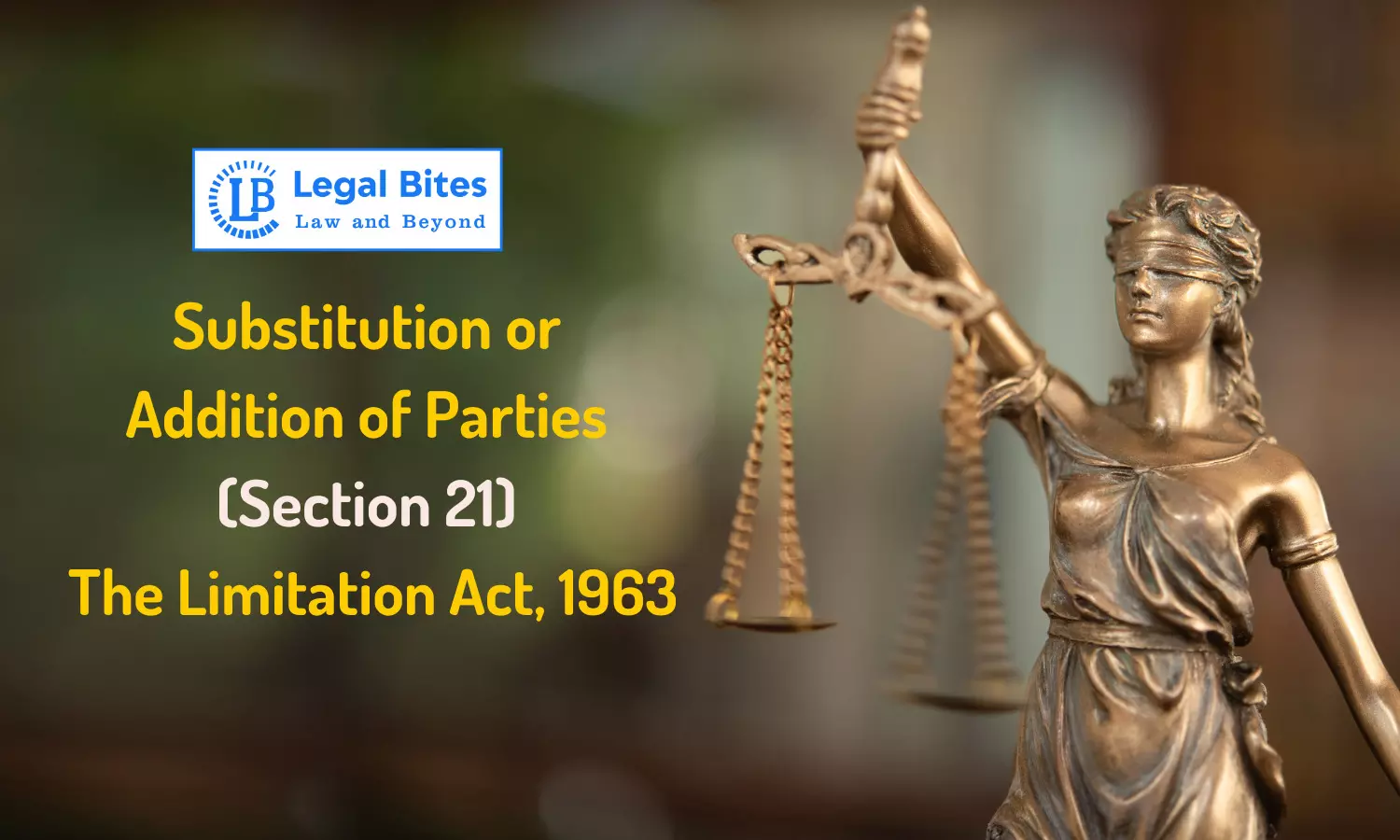Substitution/ Addition of Parties (Section 21) | The Limitation Act, 1963
The article focuses on Section 21 of the Limitation Act, 1963, which pertains to the procedure for substituting or adding parties in legal proceedings.

The article focuses on Section 21 of the Limitation Act, 1963, which pertains to the procedure for substituting or adding parties in legal proceedings.
Introduction
Limitation Act, 1963 prescribes a certain set of restrictions and limitations on certain sets of rules and regulations. It majorly prescribes the time limit that is accorded to each suit depending upon the nature of the suit and the offence or infringement of right thereby involved. The aggrieved person is thus given a time within which he or she can approach the court.
The Limitation Act, 1963 is thereby a culmination of all such rules and regulations that are to be accorded to properly understand and implement a quick justice delivery system and abstain from the lengthy process of penalising a person. Thus, it becomes imperative to understand the provisions of the Act so that any legal action which is taken beyond the prescribed timeframe that is provided under the Act can be curbed. Section 21 of the Limitation Act, 1963 covers one such important aspect which is about the ‘addition or substitution of parties’ in a legal suit. Let us understand the implications of the same through this article.
Comprehending Section 21: Effect of Substituting or Adding New Plaintiff or Defendant
Section 21(1) states that if post filing and admission of a case, the parties to the same, whether it is the plaintiff or respondent, are added or replaced by a new person; then such addition or substitution would make them a party to the suit from the date on which such change has been made and not from the beginning of the case.
The proviso states that however, there may be an exception where the subsequently added or substituted party shall be considered a party to the said suit since the beginning, for this to happen, it is imperative to prove to the court that the mistake omitting their addition or substitution was an honest mistake. It will then be the court’s discretion to agree to the same or refrain from entertaining this plea.
Section 21(2) however, provides an exception to the rule as explained above in Section 21(1). It states that the above rule shall not be applicable in circumstances wherein the new party that is added or substituted has been added or substituted due to ‘transfer of interest’ which can be because of either selling the said property involved in the case or inheritance; or if the said party’s involvement in the case is changed from being a plaintiff to now being a respondent.
Therefore, there would arise no question about limitations under Section 21 where there is a transposition of parties. Change of party’s position would not affect the limitation period for the parties which are already on record. Thus, Section 21 would only apply to the parties that are subsequently added and will not make any difference for the limitation period or any other aspect of the case regarding the Limitation Act, 1963 for those parties who are already a part of the said suit.
Illustration
Let us comprehend the same with the help of an illustration:
Rahul for instance filed a lawsuit against a bottle manufacturing company for damages to the order received by her on 1st January 2023. While the proceedings were ongoing, it was then found that the true owner of the bottle manufacturing company had changed and thus the new owner was nowhere named in the lawsuit.
The court then permitted Rahul to add the new owner as a party to the suit (respondent) on 3rd January 2024. Now, applying the provision of Section 21 of the Limitation Act, 1963, it can be stated that the lawsuit, due to the addition of the new party, will be deemed to have been instituted on 3rd January 2024 and not on 1st January 2023. But in the same case, if Rahul can prove that it was his honest mistake as the owner had subsequently changed which he was not aware of, the court may agree to backdate the institution of the suit to a date before 3rd January 2024.
But if we apply Section 21(2) in a hypothetical situation whereby the company had been passed to the new owner as a result of inheritance, then this rule would not apply.
Case Laws
Let us reinforce the concept of Section 21 as discussed above, with the assistance of some of the important case laws relating to the matter:
[1] Banwari v. Sakhraj, AIR 1931 All. 585
In this case, the court stated that if a case is defective at the very beginning of its institution stage because of non-joinder of all the mortgagees, then the same cannot be fixed by adding mortgagees post end of the limitation period as under Section 21 of the Limitation Act, 1963. But if the suit involved the addition of 2 parties who were minor at the time of the institution of the suit and have thus become a party due to inheriting the property, then the same would be admissible; provided their fathers were already a party to the said suit at the time of institution of the suit.
[2] Karuppaswamy v. C. Ramamurthy, AIR 1993 SC 2324
In this case, the apex court deliberated upon the addition of the ‘proviso’ to Section 21(1) which allowed the court to permit the continuation of the case with backdate in cases where it was proved to the court that the omission with regards to addition or substitution of the parties was the result of an honest mistake. While adjudging the same the apex court stated that:
“The proviso has appeared to permit correction of errors which have been committed due to a mistake made in good faith but only when the court permits correction of such mistake. In that event, its effect is not to begin from the date on which the application for the purpose was made, or from the date of permission but from the date of the suit, deeming it to have been correctly instituted on an earlier date than the date of making the application. The proviso to Sub-section (1) of Section 21 of the Act is obviously in line with the spirit and thought of some other provisions in Part III of the Act.”
Conclusion
It can thus be stated that Section 21 plays an important role in deciphering the initiation or institution date of suits in cases where there has been an addition or substitution of parties in a case which has already been instituted. The provision also altogether allows to make the said addition or substitution of parties. The proviso has also empowered the court to allow the back date of the institution of the lawsuit to continue in case it is proven that the addition or substitution of parties was an honest mistake. Thus, in a nutshell, it can be stated that Section 21 adds to the essence of the Limitation Act, 1963 without stringently dictating or mandating the norm, thereby leaving space for courts to deliberate.
References
[1] The Limitation Act, 1963, Available Here
[2] Salient Features of Limitation Act, 1963, Available Here
[3] Shamayem Fasih, Law of Limitation in India, Available Here
[4] Whether Section 21 of the Limitation Act is applicable to cases of transposition of parties?, Available Here

